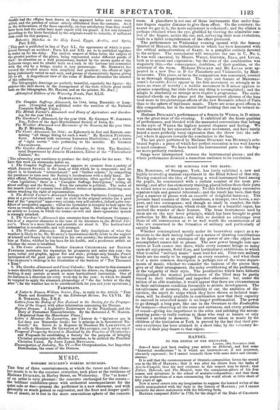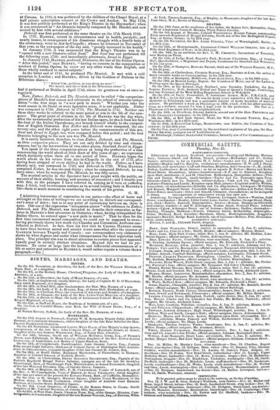HANDEL.
TO THE EDITOR OF THE SPECTATOR. Loudon. 19th November 1843.
Sea—I have just been reading your article on Deborah, and find some "historical recollections" in it which are incorrect—or, if not incorrect, obscurely expressed ; for I cannot reconcile them with some dates and circum- stances. It is said that the commencement of Oratorio-composition forms the second :era in the life of Hallam.; that it was after his return from the baths of Aix-la-Chapelle that his new existence in this respect may be dated ; that Esther, Deborah, and The Messiah, were the companion-pieces of his first season and adventure in the school of oratorio-composition; and that these were the productions of a man commencing the world afresh at little short of fifty years of age. Now it never enters into my imagination to suppose the learned writer of the article unacquainted with the facts in the history of HANDEL; yet I cannot reconcile the above statements with the following facts. HANDEL composed Esther in 1720, for the chapel of the Duke of Casanos
at Canons. In 1731, it was performed by the children of the Chapel Royal, at a half private subscription concert at the Crown and Anchor. In May 1732, it was first publicly performed at the King's Theatre in the Haymarket ; when it was announced as "An Oratorio formerly composed by Mr. Handel, and now revised by him with several additions."
Deborah was first performed at the same theatre on the 17th March 1733.
In 1737, HANDEL, ruined in circumstances and in health, paralytic, and nearly insane, in consequence of his disastrous struggle with a hostile body of the aristocracy, went to Aix-la-Chapelle; whence he returned in November of that year, as the newspapers of the day said, "greatly recovered in his health."
In January 1738, it was announced that the King's Theatre was to be "opened with a new Oratorio called Saul." But Saul was not performed till the following year, 1739; and immediately afterwards, Israel in Egypt.
In January 1741, HANDEL produced Deidarnia, the last of his Italian Operas. "After this period," says BURNEY, "having no concern in the composition or conduct of Italian Operas, he never set any other words than English, and those wholly confined to sacred subjects." In the latter end of 1741, he produced The Messiah. It met with a cold reception in London ; and HANDEL, driven by the Goddess of Dulness to the Hibernian shore-
Arrest him, goddess, or you sleep no more ! ' She heard, and drove him to the Hibernian shore."]
had it performed at Dublin in April 1742, where its greatness was at once re- cognized.
Now, Esther, Deborah, and The Messiah, cannot be called "the companion- pieces of Handel's first season and adventure in the school of oratorio•compo- sition "-the first steps in "a new path in music." Whether you take the word season in its literal or more figurative sense, it is not applicable. Esther was composed in 1720, Deborah in 1733, The Messiah in 1741. Neither can these three works be referred to the same period or wra in the life of the com- poser. The great point of division in the life of HANDEL was the day when, after the unsuccessful production of his last Italian opera, he shook from his feet the dust of the Italian Operahouse, and betook himself wholly to the composi- tion of English Oratorios. But Esther and Deborah were composed, the one twenty-one, and the other eight years before the commencement of this ars. Saul and Israel in Egypt, too, were composed before this period ; and the first Oratorio belonging to the new sera was The Messiah.
It is surely incorrect, therefore, to class Esther, Deborah, and The Messiah, as three companion-pieces. They are not only divided by time and circum- stances, bat by the intervention of two other pieces, Sautand Israel in Egypt.
You speak of the three companion-pieces as being the production of a man commencing the world afresh at little short of fifty years of age ; an expression which distinctly refers them all to one period of time. HANDEL began the world afresh on his return from Aix-la-Chapelle in the end of 1737, after having been stripped of every shilling be had in the world. Esther, as I have already said, was composed in 1720, and Deborah in 1733. When HANDEL composed Esther, he was six-and-thirty ; when he composed Deborah, he was forty-nine; when he composed The Messiah, he was fifty-seven. The musical articles in the Spectator have great weight with the public, on account of their ability, learning, and accuracy of statement ; and I trouble you with this, as the passages I have referred to, coming as it were ex cathedra, may, I think, lead to erroneous notions as to several leading facts in HANDEL'S life-facts of much moment in considering the march of his genius.
G. H. [Admitting inaccuracy of expression in our notice-the effect of haste and oversight at the time of writing-we are unwilling to disturb our correspond- ent's array of dates ; but as to any point of controversy between us, there is none. Our use of the expression " companion-pieces " with reference to Esther, Deborah, and The Messiah, was intended to describe their connexion as fea- tures in IlawnEes first adventure in Oratorios; when, having relinquished the Italian Opera, he entered upon "a new path in music." That he then for the first time commenced sacred composition, we could not be supposed to mean ; having previously shown how much the Chandos and Coronation Anthems con- tributed to Deborah. In fact, from his first visit to Canons, HANDEL seems to have lived between sacred and secular music somewhat after the manner of GARRICK between Tragedy and Comedy : our correspondent very elaborately shows by what degrees and under what circumstances the final separation took place. Our principal aim was to direct attention to certain pieces that appeared equally good in entirely distinct situations. Beyond this we had no pre- tension. To enter at large into the facts and influential circumstances of a life so active and extensive as HANDEL'S, would rather require a volume than a paragraph.-ED.]



























 Previous page
Previous page